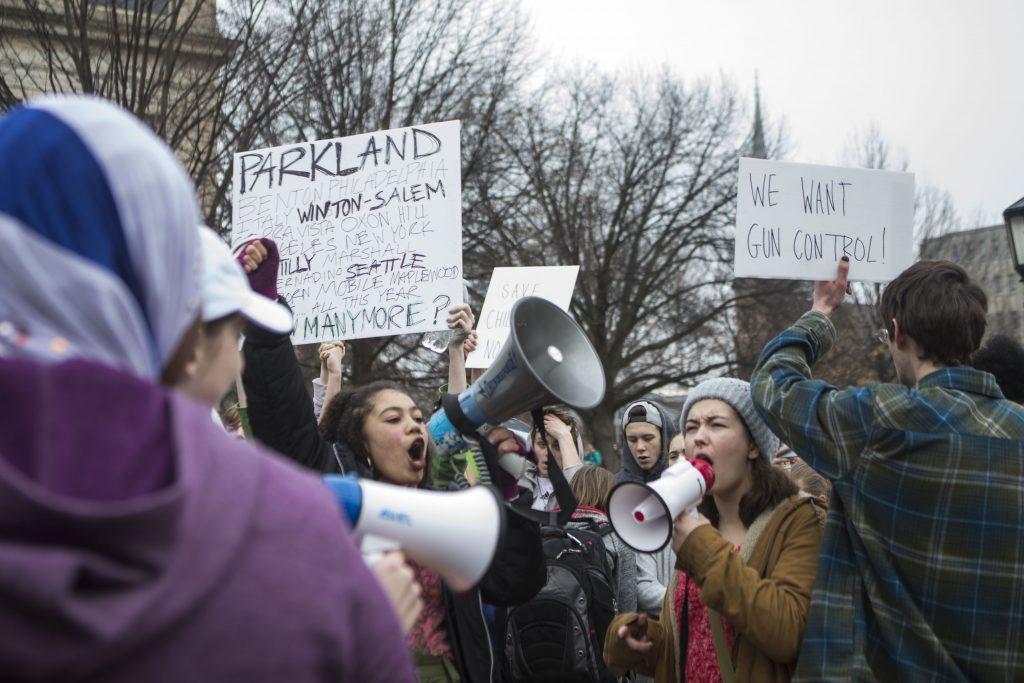Neal: One year after another school massacre: Where are we now?
Today marks the one-year anniversary of the Marjory Stoneman Douglas High School massacre. But what’s next?
From left: Iowa City High School junior Olivia Lusala and senior Eden Knoop lead a protest on the Pentacrest on Monday, Feb. 19, 2018. The protest was sparked after news of another school shooting, at Marjory Stoneman Douglas High School, in Parkland, FL on, Feb. 14. (Lily Smith/The Daily Iowan)
February 13, 2019
For many of us, Valentine’s Day is a day to celebrate the ones we love — a day to scramble for last-minute Hallmark cards and obnoxiously oversized stuffed teddy bears.
But for the family and friends of 17 Marjory Stoneman Douglas High students and staff, this day of love is a somber reminder of the ones they lost.
One year ago on this day, Feb. 14, 19-year-old Nikolas Cruz opened fire at a Parkland, Florida, school, killing 17 and injuring countless others.
The massacre, understandably, sparked a national outrage — rekindling questions about legislation, or the lack thereof, passed after the 1999 Columbine High School Shooting. The 2007 Virginia Tech Shooting. And the 2012 Sandy Hook Elementary School shooting, just to name a few.
RELATED: Young people energize ‘March For Our Lives’ demonstrators in D.C.
To me, today is a day to reflect on what’s been done, what hasn’t been talked about, and what I can do, as an Iowa-registered voter, to ensure that I help elect individuals who won’t continue this sickly cycle.
So, Iowans, what would you say is the biggest step our leaders have taken to ensure school safety?
To me, the most important step in ensuring progression is bipartisanship. (Spoiler alert: finger-pointing doesn’t have too high of a success rate.)
That being said, the School Safety Bill is a bipartisan bill that was sponsored by then-Utah Republican Sen. Orrin Hatch, and co-sponsored by Iowa’s Sens. Joni Ernst and Chuck Grassley — who were just two names on a long list of senatorial support.
The bill is intended to train and educate students and staff on ways to identify problematic behavior, to improve structure in schools, to hone crisis intervention, and to facilitate communications between schools and law enforcement — it passed the House 407-10, and even gained the support of President Donald Trump.
RELATED: Judiciary hearing points to failures leading to Parkland shooting
The bipartisan effort, as Democratic Minnesota Sen. Amy Klobuchar said, is just one part of the solution.
And yeah, she’s right.
On both sides, there’s a continuous discussion as to how to stop the bad guy.
That is a common goal.
This piece of legislation highlights the obvious: No one wants students fearing for their lives.
Of all the mass shootings our nation has experienced (wow, what a sad, 21st-century truth), schools seem to be a common thread. And with the legal, state obligation a parent or guardian holds to educate her or his child, these continuous spurts of deadly rampages create an unspeakable burden.
I mean, are these kids safe?
When I chose to discuss the one-year anniversary of this heinous event, I undoubtedly held an urge to come out swinging, to do nothing but yell at my party’s opposition for failing to do what I felt is their part.
But although I realize “Thoughts and Prayers” just simply aren’t enough, and while I do realize holding politicians accountable is a must in all respects, I also realize the students who survived this monstrosity, who spearheaded the influential March for Our Lives, aren’t just clenching their fists and drowning out their naysayers with argument, they’re actually … communicating. They’re facilitating a conversation — so we can end this cycle, together.
So that these 17 senseless deaths, and the other senseless, preventable deaths before them need not be in vain.
RELATED: Iowa’s congressional leaders respond to ‘accepting’ NRA money



